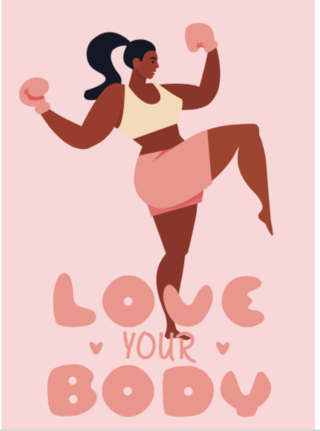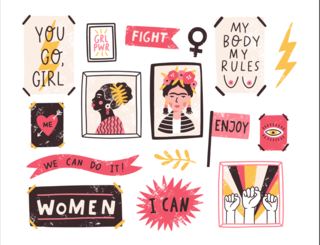Beauty
Look Out for Girls' Back-to-School Appearance Concerns
While you focus on COVID, your teenager may have other back-to-school worries.
Posted August 25, 2020
Girls have had the longest breaks from school of their lives. Many girls have been transformed by puberty in the months since they’ve last seen their friends and classmates. Others have changed their hair, grown in stature, begun exercising, or gained weight, each a reason for heightened self-consciousness in relation to returning to school. You may be worried about your daughter and her school’s pandemic-related preparations; she may be thinking about how her peers will perceive her.
Researchers from the Center for Body Image Research and Policy at the University of Missouri recently found that 40% of young people would rather contract COVID-19 than gain 25 pounds. One look on Instagram and it’s easy to see that the quarantine has exaggerated eating concerns among men, women, and children. In my research, I’ve found that up to 90% of girls report body image concerns. I’m concerned that body concerns are even more crippling for some girls now than they were six months ago, with many girls believing that improving their appearance would make them happier, healthier, and better liked.
How should we handle our girls’ COVID-19-triggered, appearance-related concerns?
Ask questions and listen
First, we need to start with the basics when it comes to parenting teens. We need to ask questions and listen to the answers. Resist the temptation to assume that their experiences are like yours at the same age. “How do you feel about going back to school?” “Are you excited to see your classmates after this much time away from them?” and even, “You seem taller than last fall, do you need new clothes before school starts?” may be good openers. Remember, your goal is to hear your daughter, not provide your solutions to problems you had as a teenager.

Question beauty ideals
A mother can never go wrong by being open-minded about conventional standards for beauty, fashion, and cosmetics; what is typical is often unnecessary and sometimes even oppressive. We don’t want to sound like we are out of touch with popular culture, but we do want our girls to start to discover that much of beauty culture is maladaptive. For example, did you know that women spend an average of an hour a day tending to their appearances? That’s about two weeks per year that could be devoted to other activities.
Eighty percent of girls aged 9-11 are already using beauty and personal care products and developing beauty habits that may cost them many thousands of dollars throughout their lives. We want our girls to notice and rethink conformity to arbitrary standards – from wearing uncomfortable clothing to pursuing cosmetic surgery. Ultimately, we want our girls to know that they are so much more than how they look.
Teach that food is fuel – and fun
Girls’ concerns about what they eat follow close behind concerns about how they look. Instagram ads, television commercials, and friends’ advice may all point to dietary restriction, but growing girls need to eat. We want our girls to understand that attempts to avoid foods they enjoy is unnecessary; restriction is likely to backfire, leading to a sense of deprivation and often overconsumption. This is not to say that our homes need to be fully stocked with chips and cookies, but the science overwhelmingly suggests that treating chips and cookies as forbidden fruit will increase their desirability. Instead, we want our girls to be intuitive eaters, able to pay attention to physical signals of hunger and satiety, their cravings, and what makes them feel good when they eat it. Eating healthy foods should be conceptualized as what it is – a form of self-care.
Use social media for good
It may seem like an oxymoron to have “social media” and “good” in the same sentence, but it does not have to be. Girls can learn to be careful of comparisons; it is essentially celebrities’ and influencers’ job to look good. The rest of us have other responsibilities and life goals that extend beyond wearing the “in” shade of lip gloss. Learning to value their personalities, intellects, senses of humor, and friendships over their looks is an important life lesson for girls of every age. Following positive forces on social media that stress self-acceptance and prize diversity can make this lesson easier to learn. Look at Jameela Jamil’s i_weigh movement (the web page, and on Instagram and Twitter) or other influencers and regular folks who promote body positivity – and prioritize mental health more generally.

We don’t need to cover all of these conversations before the first day of school. In fact, research suggests that discussions of serious or important topics may be best had across many short conversations; a lengthy lecture from a parental figure is likely to be met with the typical teenager’s eye roll.
However, while we’re stocking up on hand sanitizer and converting our dining rooms into classrooms, we can’t lose sight of the fact that most teenagers are much less focused on COVID-19 and much more focused on whether or not their recent post collected a large number of “likes.” In many ways, addressing our girls’ ongoing, typical teenage concerns may be a lot easier than addressing the larger and more existential issues that have become apparent in 2020. Further, helping our girls get on solid footing now with a secure sense of self may poise them to cope with whatever crises they come across in adulthood.


